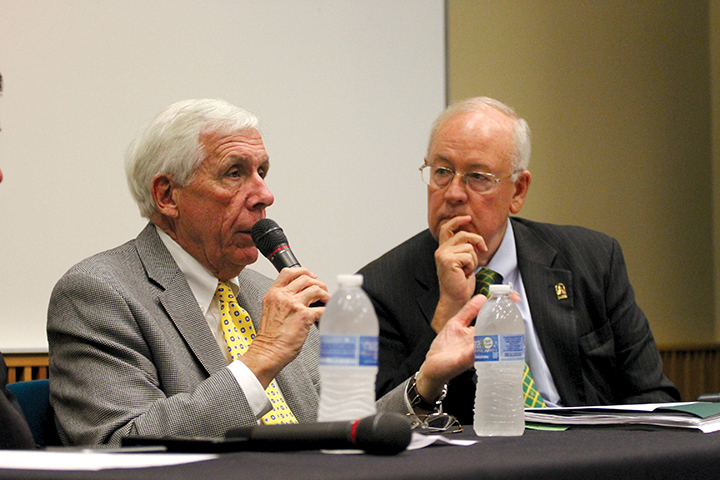
Hannah Haseloff
By Shannon Barbour
Staff Writer
Panelists discussed religious freedom and how the Waco community can help those affected by religious persecution on Thursday at the Global Religious Freedom Summit in the Kayser Auditorium of the Hankamer School of Business.
President and Chancellor Ken Starr joined the panel and spoke about witnessing religious persecution and how students can get involved.
“International religious freedom is a matter of American national security and global peace,” Starr said.
Bob Fu, pastor and president of China Aid Association, defined freedom of religion as the freedom of religious belief and the ability to practice religious beliefs freely, something he said is not present in China.
The panelists mentioned the Islamic State, certain Middle Eastern countries and North Korea as examples of religious persecution, but they primarily focused on China.
Frank Wolf, former Congressman of Virginia and the new Wilson Chair in Religious Freedom for Baylor, said persecution is increasing because countries, like America, don’t discuss human rights issues. Instead, he said, they focus on the issue of nuclear weapons.
“I think [religious persecution is] getting worse now than it’s been for centuries. Part of the problem is the United States is not providing the leadership it used to,” Wolf said of the growing issue in North Korea and the Middle East.
Fu was imprisoned by the Chinese government for illegal evangelism in 1996 and now works in Midland to bring awareness to persecuted residents in China.
“From my personal experience, I know that there is lack of true religious freedom in China. That gave me urgency when I was in prison,” Fu said.
Fu said he has experienced a lack in leadership from the West.Fu said it has affected the way the Chinese are treated.
“Leadership really makes a train effect to the Chinese and other human rights communities,” Fu said. “They feel we are abandoned and betrayed. That is something I have experienced.”
Esther Zhao, a freshman and audience member, has observed the threat of the Chinese government while she lived in China with her father.
“My dad shared the gospel with people in church and helped them find jobs,” Zhao said.
Zhao and her father were not persecuted, but she agrees with what panelists Fu, Wolf and Starr said about persecution in China.
Fu hopes to continue his work in Texas with by working with prisoners and those who cannot freely practice their religion.
“We have the freedom the Chinese do not enjoy,” Fu said. “I feel every time when I am able to advocate on behalf of those who do not have freedom, I cherish the very freedom in this society tremendously. I feel so privileged.”
The panelists ended the discussion with ways members of the community can get involved, such as sending letters to prisoners and contacting state officials.
“Begin educating yourselves,” Starr said. “Before you can pray as meaningfully as you would please, become more informed about the issue, and become an ambassador for religious freedom.”






